With the ongoing COVID-19 pandemic, utilities across the nation continue to adapt to rapidly changing conditions through a number of measures, from suspending water shut-offs to implementing cost-saving maneuvers like reducing energy costs.
To better understand some of the financial implications of the pandemic, the Environmental Finance Center surveyed 93 water and wastewater utilities in North Carolina in early May on a range of topics, including payment plans for delinquent customers, how long they can pay all operating and capital expenses, changes in total revenue collected, staffing for utility operations, plans for the next fiscal year’s rates, and the scope, funding, or timing of capital infrastructure projects for the year.
Four key insights from the survey are detailed below. Each finding is coupled with graphs showing the response distribution for the survey question connected to the key finding.
1. While most utilities expect total revenue collected to decrease due to COVID-19 and are uncertain as to how much, the vast majority report no changes in plans for FY20-21 rates.
With reductions in non-residential water use, increased difficulty among residential customers to pay water bills, and other financial complications, 60% of the surveyed utilities anticipate decreases in revenue collected with uncertainty as to how much, while 29% of the surveyed utilities were able to identify revenue losses from anywhere between 2% to greater than 30% of their FY 2019 operating revenues. Yet even as water utilities foresee appreciable revenue losses, as of right now, 64% of those surveyed reported no change in plans for FY20-21 service rates as they adjust their budgets for the next year to offset current losses.
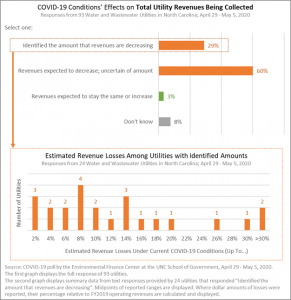
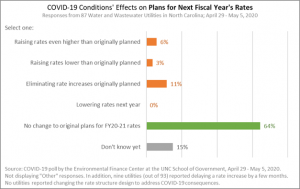
2. Despite uncertainty in the amount of revenue collected, the majority of surveyed utilities have not only maintained current hours and staffing but also expect to be able to cover operating and capital expenses for anywhere between 7 months to over a year.
During past periods of economic hardship, like the recession in the late 2000’s, utilities focused on reducing operating expenditures through strategies like cutting labor costs with salary freezes, hiring freezes, early retirement offers, and layoffs. 53% of the survey respondents disclosed that they have maintained both prior hours and staffing, but have changed the structure of their shifts. Additionally, more than half of the surveyed utilities will be able to pay all operating and capital expenses, in general, for anywhere between 7 months to over a year with current reserves even as revenue losses accumulate.
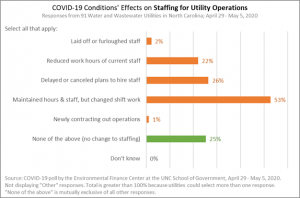
3. Relating to Executive Order 124, the three most popular planned features of customer payment plans to assist delinquent customers include starting a payment plan within the 60-day period, paying a fixed fee for 6 months after the 60-day period, and allowing customers to pay off the full amount prior to the end of 6 months.
Enacted March 31, 2020, North Carolina Executive Order 124 prohibits electric, gas, and water and wastewater utilities from disconnecting delinquent customers during the COVID-19 pandemic and from collecting fees, penalties, or interest on late payments, while also giving residential customers at least six months to pay any outstanding bills after the original 60-day EO124 grace period. As a result of the order, many utilities have adjusted customer payment plans to help assist residential customers affected by COVID-19: 67% of responding water and wastewater utilities (n=73) will allow customers to pay a fixed fee for the 6 months, 66% will give customers the option to pay off the full amount prior to the end of the 6 months, and 59% aimed to help customers initiate a payment plan during the grace period.
However, it should be noted that Executive Order 142, passed on May 30, 2020, extended the original 60-day period by another two months, meaning that utilities will not be able to terminate services for late payments or enforce penalties until July 29. Because the EFC’s COVID-19 survey on water and wastewater utilities was conducted prior to these changes, the responses below do not reflect the new termination dates.
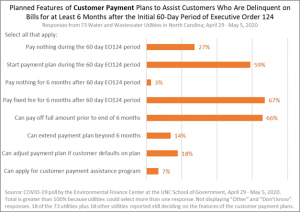
4. While a considerable number of surveyed utilities report delays in capital infrastructure projects, more than 50% of the responses indicate no changes in planned projects for the year.
Finally, while many utilities expect significant revenue shortfalls due to the pandemic, instead of turning to measures like delaying infrastructure projects to allay expenses in the short-term, 55% of the surveyed utilities communicated no changes in planned projects for the year, implying current projects will proceed uninhibited or that no projects were planned for the year to begin with.
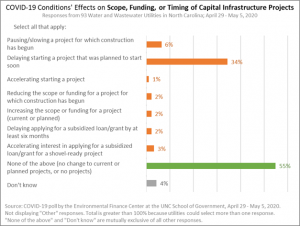
In Conclusion
The COVID-19 pandemic has imposed several unexpected and unprecedented conditions, from requiring inessential businesses to remain closed to leaving many residential customers unemployed or with reduced work hours, that may exacerbate financial losses for water and wastewater utilities across the nation. While most utilities predict considerable revenue losses for the year due to the coronavirus, the EFC’s survey of NC water and wastewater utilities demonstrates that many are unsure of the extent of shortfall, as well as how to respond with actions such as raising rates for the next fiscal year or delaying capital infrastructure projects.
Additional Resources
As the COVID-19 pandemic continues to evolve and impose new financial complications, the EFC is posting free resources and guidance to utilities on our website. Our resources and links to COVID-19 resources from other organizations are listed here. Additionally, the following links are other recent COVID-19 blog posts located on the EFC website: How Utilities in the Past have Saved Money during Economic Hardship: Similarities and Differences for COVID-19, Municipal Finance in a Pandemic: How is the Market Responding?, Water System Reserves During the COVID-19 Pandemic, and Financial Implications of COVID-19 for Water and Wastewater Utilities.
Radhika Kattula is an undergraduate student at the University of North Carolina at Chapel Hill, where she is pursuing a double major in Economics and Environmental Studies with a concentration in sustainability. At the EFC, Radhika researches water and wastewater financing mechanisms and assists on a variety of projects.

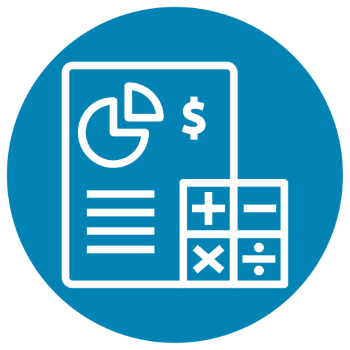



0 Comments
1 Pingback